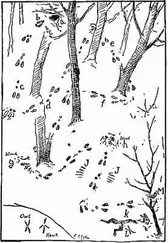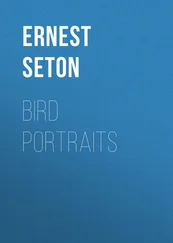Ernest Seton - Rolf in the Woods
Здесь есть возможность читать онлайн «Ernest Seton - Rolf in the Woods» весь текст электронной книги совершенно бесплатно (целиком полную версию без сокращений). В некоторых случаях можно слушать аудио, скачать через торрент в формате fb2 и присутствует краткое содержание. Год выпуска: 1997, Жанр: Приключения про индейцев, Исторические приключения, на английском языке. Описание произведения, (предисловие) а так же отзывы посетителей доступны на портале библиотеки ЛибКат.
- Название:Rolf in the Woods
- Автор:
- Жанр:
- Год:1997
- ISBN:нет данных
- Рейтинг книги:3 / 5. Голосов: 1
-
Избранное:Добавить в избранное
- Отзывы:
-
Ваша оценка:
- 60
- 1
- 2
- 3
- 4
- 5
Rolf in the Woods: краткое содержание, описание и аннотация
Предлагаем к чтению аннотацию, описание, краткое содержание или предисловие (зависит от того, что написал сам автор книги «Rolf in the Woods»). Если вы не нашли необходимую информацию о книге — напишите в комментариях, мы постараемся отыскать её.
Rolf in the Woods — читать онлайн бесплатно полную книгу (весь текст) целиком
Ниже представлен текст книги, разбитый по страницам. Система сохранения места последней прочитанной страницы, позволяет с удобством читать онлайн бесплатно книгу «Rolf in the Woods», без необходимости каждый раз заново искать на чём Вы остановились. Поставьте закладку, и сможете в любой момент перейти на страницу, на которой закончили чтение.
Интервал:
Закладка:
Then he heard, "As soon as the colonel" and other broken phrases.
It was a most difficult place for Rolf; he was tormented with thistles in his face and down his neck; he dared not change his position; and how long he must stay was a problem. He would try to escape when all was still.
The nearer soldiers settled to rest now. All was very quiet when Rolf cautiously peeped forth to see two dreadful things: first, a couple of sentries pacing up and down the edges of the camp; second, a broad, brilliant, rising moon. How horrible that lovely orb could be Rolf never before knew.
Now, what next? He was trapped in the middle of a military camp and undoubtedly La Colle Mill was the rendezvous for some important expedition.
He had ample time to think it all over. Unless he could get away before day he would surely be discovered. His uniform might save his life, but soldiers have an awkward, hasty way of dealing summarily with a spy—then discovering too late that he was in uniform.
From time to time he peered forth, but the scene was unchanged—the sleeping regiment, the pacing sentries, the ever-brightening moon. Then the guard was changed, and the sentries relieved selected of all places for their beds, the bank beside the hay-cock. Again one of them went to help himself to some hay for a couch; and again the comic anger as he discovered it to be a bed of thorns. How thankful Rolf was for those annoying things that pricked his face and neck.
He was now hemmed in on every side and, not knowing what to do, did nothing. For a couple of hours he lay still, then actually fell asleep. He was awakened by a faint rustling near his head and peered forth to see a couple of field mice playing about.
The moon was very bright now, and the movements of the mice were plain; they were feeding on the seeds of plants in the hay-cock, and from time to time dashed under—the hay. Then they gambolled farther off and were making merry over a pod of wild peas when a light form came skimming noiselessly over the field. There was a flash, a hurried rush, a clutch, a faint squeak, and one of the mice was borne away in the claws of its feathered foe. The survivor scrambled under the hay over Rolf's face and somewhere into hiding.
The night passed in many short naps. The bugle sounded at daybreak and the soldiers arose to make breakfast. Again one approached to use a handful of hay for fire-kindler, and again the friendly thistles did their part. More and more now his ear caught suggestive words and sounds—"Plattsburg"—"the colonel"—etc.
The breakfast smelt wonderfully captivating—poor Rolf was famished. The alluring aroma of coffee permeated the hay-cock. He had his dried meat, but his need was water; he was tormented with thirst, and stiff and tortured; he was making the hardest fight of his life. It seemed long, though doubtless it was less than half an hour before the meal was finished, and to Rolf's relief there were sounds of marching and the noises were drowned in the distance.
By keeping his head covered with hay and slowly raising it, he was safe to take a look around. It was a bright, sunny morning. The hay-cock, or thistle-cock, was one of several that had been rejected. It was a quarter-mile from cover; the soldiers were at work cutting timber and building a stockade around the mill; and, most dreadful to relate, a small dog was prowling about, looking for scraps on the scene of the soldiers' breakfast. If that dog came near his hiding-place, he knew the game was up. At such close quarters, you can fool a man but not a dog.
Fortunately the breakfast tailings proved abundant, and the dog went off to assist a friend of his in making sundry interesting smell analyses along the gate posts of the stockade.
Chapter 76.
The Duel
This was temporary relief, but left no suggestion of complete escape. He lay there till nearly noon suffering more and more from the cramped position and thirst, and utterly puzzled as to the next move.
"When ye don't like whar ye air, git up without any fuss, and go whar ye want to be," was what Sylvanne once said to him, and it came to Rolf with something like a comic shock. The soldiers were busy in the woods and around the forges. In half an hour it would be noon and they might come back to eat.
Rolf rose without attempting any further concealment, then stopped, made a bundle of the stuff that had sheltered him and, carrying this on his shoulder, strode boldly across the field toward the woods.
His scout uniform was inconspicuous; the scouts on duty at the mill saw only one of themselves taking a bundle of hay round to the stables.
He reached the woods absolutely unchallenged. After a few yards in its friendly shade, he dropped the thorny bundle and strode swiftly toward his own camp. He had not gone a hundred yards before a voice of French type cried "'Alt," and he was face to face with a sentry whose musket was levelled at him.
A quick glance interchanged, and each gasped out the other's name.
"Francois la Colle!"
"Rolf Kittering! Mon Dieu! I ought to shoot you, Rolf; I cannot, I cannot! But run, run! I'll shoot over your head," and his kindly eyes filled with tears.
Rolf needed no second hint; he ran like a deer, and the musket ball rattled the branches above his shoulders.
In a few minutes other soldiers came running and from La Colle they heard of the hostile spy in camp.
"I shoot; I t'ink maybe I not hit eem; maybe some brood dere? No, dat netting."
There were both runners and trackers in camp. They were like bloodhounds and they took up the trail of the fugitive. But Rolf was playing his own game now; he was "Flying Kittering." A crooked trail is hard to follow, and, going at the long stride that had made his success, he left many a crook and turn. Before two miles I they gave it up and the fugitive coming to the river drank a deep and cooling draught, the first he had had that day. Five miles through is the dense forest that lies between La Colle and the border. He struck a creek affluent of the Richelieu River and followed to its forks, which was the place of rendezvous with Quonab.
It was evening as he drew near and after long, attentive listening he gave the cry of the barred owl:
The answer came: a repetition of the last line, and a minute later the two scouts were together.
As they stood, they were startled by a new, sudden answer, an exact repetition of the first call. Rolf had recovered his rifle from its hiding place and instantly both made ready for some hostile prowler; then after a long silence he gave the final wail line "hoooo-aw" and that in the woods means, "Who are you?"
Promptly the reply came:
"Wa wah wa wah Wa wah wa hoooo-aw."
But this was the wrong reply. It should have been only the last half. The imitation was perfect, except, perhaps, on the last note, which was a trifle too human. But the signal was well done; it was an expert calling, either an Indian or some thoroughly seasoned scout; yet Quonab was not deceived into thinking it an owl. He touched his cheek and his coat, which, in the scout sign language, means "red coat," i. e., Britisher.
Rolf and his partner got silently out of sight, each with his rlile cocked and ready to make a hole in any red uniform or badge that might show itself. Then commenced a very peculiar duel, for evidently the enemy was as clever as themselves and equally anxious to draw them out of cover.
Wa-wah-wa hooo-aw called the stranger, giving the right answer in the wrong place. He was barely a hundred yards off, and, as the two strained their senses to locate him, they heard a faint click that told of his approach.
Rolf turned his head and behind a tree uttered again the Wa-wah-a—hoo which muffled by his position would convince the foe that he was retreating. The answer came promptly and much nearer:
Читать дальшеИнтервал:
Закладка:
Похожие книги на «Rolf in the Woods»
Представляем Вашему вниманию похожие книги на «Rolf in the Woods» списком для выбора. Мы отобрали схожую по названию и смыслу литературу в надежде предоставить читателям больше вариантов отыскать новые, интересные, ещё непрочитанные произведения.
Обсуждение, отзывы о книге «Rolf in the Woods» и просто собственные мнения читателей. Оставьте ваши комментарии, напишите, что Вы думаете о произведении, его смысле или главных героях. Укажите что конкретно понравилось, а что нет, и почему Вы так считаете.




